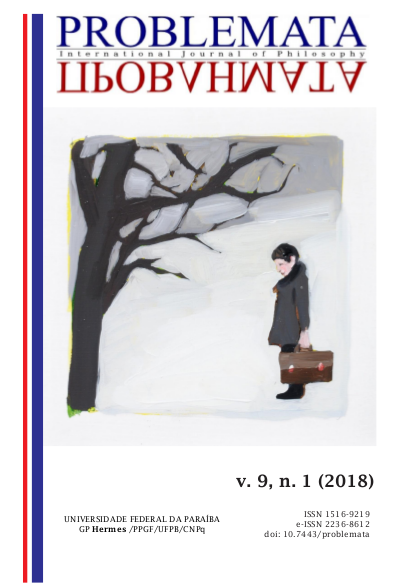PRELIMINARY CONSIDERATIONS ON THE IDEA’S WAY OF BEING IN SCHOPENHAUER’S METAPHYSICS
DOI:
https://doi.org/10.7443/problemata.v9i1.38727Keywords:
Will, Nature, Idea, Species, Objectivation.Abstract
This paper offers some remarks on the ontological problem of the Schopenhauer’s theory of Ideas, i.e. their double and even “contradictory” character of being at once eternal, universal, and on the other hand individuated and determined as produced by the struggle of the Will against itself. Should the Ideas really have a metaphysical role, not a simple epistemic one? How can them be plural and why and what that really means? Should we take them as a third besides or between Will and Representation? For the sake of solving such problems it is not enough a reasoning on the knowledge of “Platonic Ideas” as an object. We must instead comprehend the role of Ideas under a peculiar meaning and a mere relative kind of eternity as well. This can be done initially by the means of a careful consideration on the second book of Schopenhauer’s main work, in which he brings out the Idea as a metaphysical entity for the first time. It would follow unexpected consequences concerning Schopenhauer’s Philosophy of Nature and even his Ethics.
Downloads
References
ARISTÓTELES. Historia animalium. Trad. para o inglês por D’Arcy Wentworth Thompson. The Basic Works of Aristotle. Ed. Richard McKeon. New York: Modern Library, 2001. p. 631-640.
CACCIOLA, M. L. M. e O. Schopenhauer e a questão do dogmatismo. São Paulo: EDUSP, 1994.
HEIDEGGER, M. O princípio do fundamento. Trad. Jorge Telles Menezes. Lisboa: Instituto Piaget, 1999.
HÖSLE, V. O sistema de Hegel: o idealismo da subjetividade e o problema da intersubjetividade. São Paulo: Loyola, 2007.
MORAES, D. O dualismo kantiano e sua crítica por Schopenhauer: considerações acerca do caráter analógico da filosofia prática e suas limitações. Princípios: revista de filosofia – Publicação do Programa de Pós-Graduação em Filosofia da UFRN. Natal, v. 20, n. 33, jan.-jun. 2013, p. 411-447. Disponível em: < https://periodicos.ufrn.br/principios/article/view/7525/5595 >. Acesso em: 15 set. 2017.
MORAES, D. O logos em Fílon de Alexandria: a fronteira entre o pensamento grego e o pensamento cristão nas origens da teologia bíblica. Natal: EDUFRN, 2017. Disponível em: < https://repositorio.ufrn.br/jspui/handle/123456789/23984 >. Acesso em: 31 jan. 2018.
PERNIN, M.-J. Schopenhauer: decifrando o enigma do mundo. Rio de Janeiro: J. Zahar, 1995.
RAND, S. Subjetividade animal e o sistema nervoso na Filosofia da Natureza de Hegel. Trad. Verrah Chamma. Revista Eletrônica Estudos Hegelianos. Rio de Janeiro, v. 7, n. 12, jan.-jun. 2010, p. 32-51. Disponível em: < http://ojs.hegelbrasil.org/index.php/reh/article/view/42/37 >. Acesso em: 15 set. 2017. Original em inglês: Animal subjectivity and the nervous system in Hegel’s Philosophy of Nature. Disponível em: < https://www.academia.edu/797764/Animal_Subjectivity_and_the_Nervous_System_in_Hegels_Philosophy_of_Nature >.
ROGER, A. Vocabulário de Schopenhauer. São Paulo: M. Fontes, 2013.
SANGUINETTI, F. La teoria hegeliana della sensazione. Trento: Verifiche, 2015.
SHAPSHAY, S. Schopenhauer’s Aesthetics. In: ZALTA, Edward N. (Ed.). The Stanford Encyclopedia of Philosophy. Summer 2012 Edition. Disponível em:
< https://plato.stanford.edu/archives/sum2012/entries/schopenhauer-aesthetics/ >. Acesso em: 15 set. 2017.
SCHOPENHAUER, A. Sämmtliche Werke. Ed. Julius Frauenstädt. Leipzig: Brockhaus, 1877. 6 v.
SCHOPENHAUER, A. Sobre a visão e as cores. Trad. Erlon José Paschoal. São Paulo: Nova Alexandria, 2003.
SCHOPENHAUER, A. O mundo como vontade e representação: tomo II – complementos. Trad. Eduardo Ribeiro da Fonseca. Curitiba: UFPR, 2014. v. 1.
SCHOPENHAUER, A. O mundo como vontade e como representação: tomo I. Trad. Jair Barboza. 2. ed. rev. São Paulo: UNESP, 2015a.
SCHOPENHAUER, A. O mundo como vontade e como representação: tomo II. Trad. Jair Barboza. São Paulo: UNESP, 2015b.
WICKS, R. Arthur Schopenhauer. In: ZALTA, Edward N. (Ed.). The Stanford Encyclopedia of Philosophy. Summer 2017 Edition. Disponível em:
< https://plato.stanford.edu/archives/sum2017/entries/schopenhauer/ >. Acesso em: 15 set. 2017.
Downloads
Published
Issue
Section
License
Authors who publish with this journal agree to the following terms:
- Authors retain copyright and grant the journal right of first publication with the work simultaneously licensed under a Creative Commons Attribution License that allows others to share the work with an acknowledgement of the work's authorship and initial publication in this journal.
- Authors are able to enter into separate, additional contractual arrangements for the non-exclusive distribution of the journal's published version of the work (e.g., post it to an institutional repository or publish it in a book), with an acknowledgement of its initial publication in this journal.
-
- Authors are permitted and encouraged to post their work online (e.g., in institutional repositories or on their website) prior to and during the submission process, as it can lead to productive exchanges, as well as earlier and greater citation of published work (See The Effect of Open Access).





